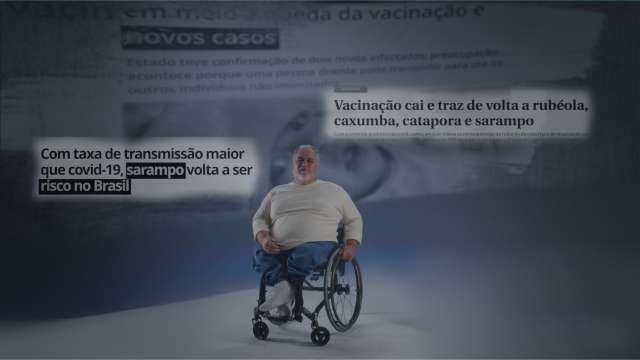You will read this article in 6 minutes

Faced with this scenario, the Government of Minas Gerais launched a campaign to make the population aware of the importance of vaccination. The strategy to encourage immunization began to be publicized on television, radio and the internet on 11/27 and features the testimony of Carlos Eduardo Rodrigues Vale, 49 years old. A resident of Contagem, in the Metropolitan Region of Belo Horizonte (RMBH), he had polio at the age of 2, a time when vaccination against the disease was not yet widespread.
“Life goes on, without a doubt. I believe that even a person with sequelae can aspire to happiness, but it is the parents' duty to corroborate so that happiness is complete, healthy, without adverse situations. And the vaccine is indeed one of the mechanisms that makes this trajectory much lighter, without other complications that can, suddenly, not only undo the dream of those who have not been vaccinated, but of a father and a mother who see their child in this situation”, says the sports director.
campaign goal
Extended twice in 2022, the polio vaccination campaign in Minas did not reach the target of 95% recommended by the Ministry of Health. During the campaign, 881,235 thousand children aged between 1 and 4 years were vaccinated, which is equivalent to 84.30% of the estimated public, according to the Ministry of Health Panel on 11/28/2022.
The poliomyelitis vaccine is part of the National Vaccination Calendar, is distributed by the Unified Health System (SUS) and is available in basic health units.
Vaccination is recognized as one of the most successful public health interventions. Through vaccination it is possible to protect against diseases and their complications. When a person is vaccinated, he not only protects himself, but also protects those close to him and the community. Therefore, it is important to keep the vaccination card up to date.
Vaccination coverage in Minas Gerais
According to the National Immunization Program Information System (SIPNI), in 2021, Minas Gerais ranked sixth in the national ranking regarding polio vaccination in children under 1 year old. With regard to children aged 1 year, the state ranked fourth in the national classification for the vaccine in 2021.
In the triple viral scenario, which protects against measles, rubella and mumps, Minas Gerais ranked fifth nationally in vaccination coverage for the first dose in children aged 1 year, and third for the second dose, last year. From January to June 2022, the coverage of the first dose of the MMR in Minas was 74.44% and, of the second dose, 53.95%, according to SIPNI data on 11/14. The goal of the Ministry of Health is also 95%.
The National Influenza Vaccination Campaign, which also caters to adults, has had a large reduction in vaccination coverage in recent years. In 2020, 103% of the target audience was immunized. In 2022, so far, coverage in the campaign was 78.5%.
Actions and awareness
In addition to seeking to raise awareness among people from Minas Gerais about the need to follow the calendar and keep their vaccination card up to date, the State Department of Health carries out other actions in this regard in the municipalities, ranging from the preparation and dissemination of technical documents, to meetings with the references of the immunization program to update and discuss doubts of the Regional Health Units and the surveillance of the so-called Events Supposedly Attributable to Vaccination or Immunization (Esavi) to increase the reliability of vaccines.
According to the coordinator of the SES-MG Immunization Program, Josianne Dias Gusmão, the scenario of low vaccination coverage is a concern of the State and, therefore, strategic actions are carried out on several fronts to ensure that campaigns and routine vaccination reach the target audiences with the coverage recommended by the Ministry of Health.
“We can highlight the partnership with UFMG, through action research; also the intersectoral surveillance of indicators carried out by Gamov; the training of professionals who work in vaccine rooms in partnership with the School of Public Health (ESP); the analysis, preparation and dissemination of the Risk Classification for the Reintroduction of Vaccine-preventable Diseases in children under two years of age; in addition to social mobilization actions, promoted in partnership with all 853 municipalities, in order to raise the population's awareness of the importance of vaccination. Vaccines save lives, do your part and keep your vaccine card up to date”, highlights the coordinator.
Mumps
Mumps is a viral disease that is transmitted through contact with an infected person. It is also known as parotitis, as it usually causes swelling in the region of the parotid glands (a gland located in the face). The most common symptoms are fever, headache, muscle pain, eye pain, pain in the jaw region, pain in the ear region, swelling in the parotid ganglia region and, in some cases, vomiting.
Treatment for mumps usually consists of medications to relieve symptoms, rest, and fluid intake. However, in some cases, it is necessary to use antibiotics to prevent possible complications.
The prevention of mumps is done through vaccination. The vaccine is safe and effective in preventing the disease. It should be given to children aged between 12 and 15 months and to adolescents and adults who have never been vaccinated.
Rubella
Rubella is an infectious disease caused by the Rubivirus virus of the Togaviridae family. It is also known as German measles or triple measles. Although it is rarely fatal, the infection can result in serious complications if not treated properly.rubella symptoms
Rubella symptoms usually begin to appear between 2 and 3 weeks after exposure to the virus. These symptoms include:
- Fever
- Sore throat
- Cough
- Runny nose
- Conjunctivitis
- Red spots on the skin (rubella spots)
- General malaise
- Enlarged lymph nodes
Treatment
There is no specific treatment for rubella, but the symptoms can be treated with analgesics to reduce fever and pain, antihistamines to reduce runny nose and conjunctivitis, and rest to speed up the recovery process.
Complications
The most common complications of rubella are eye infections, otitis media and pneumonia. In addition, the infection can cause serious problems with fetal development, especially if the mother is infected during the first three months of pregnancy.
Prevention
The best way to prevent rubella is to stay up-to-date with the recommended vaccines for rubella. The triple vaccine (against measles, mumps and rubella) is given in two doses, with the first usually given between 12 and 15 months of age and the second between 4 and 6 years of age. In addition, it is important to avoid contact with infected people and practice proper hygiene measures.
Measles
Measles is a highly contagious infectious disease caused by the virus of the same name. It is transmitted through droplets of saliva and respiratory secretions, when the infected person coughs, sneezes or speaks. Symptoms include fever, cough, runny nose, conjunctivitis and red spots on the body.
The disease is particularly dangerous for young children, who can experience serious complications such as pneumonia and encephalitis, which can lead to death. Measles can also cause complications in adults, such as bacterial infections, anemia, ear infections and breathing problems.
Measles prevention is carried out through vaccination. In Brazil, the triple vaccine against measles, mumps and rubella (SCR) is administered at 12 months of age and around 15 months, in addition to the booster dose at 4-5 years. The vaccination scheme is essential to prevent the transmission and spread of the disease.
Chickenpox
Chickenpox is a highly contagious viral infection that primarily affects children, but it can also affect adults. It is caused by the Varicella-Zoster virus, the same virus responsible for mumps and shingles.
The most common symptoms of chicken pox include: a rash of small blisters filled with clear fluid, severe itching, fever, headache, tiredness, muscle pain and malaise. Symptoms usually improve within about two weeks, but some children and adults may develop complications such as pneumonia, bacterial skin infection, and encephalitis.
Chickenpox can be prevented with the Varicella-Zoster vaccine, which is recommended for children aged 12 months.
For more information about vaccines in Minas Gerais, visit www.saude.mg.gov.br/vacinamaisminas.
With information from the health department of Minas Gerais. Photography: Disclosure.
